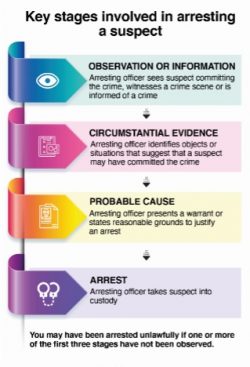How does an arresting officer justify that there are reasons for arrest? What is probable cause?
In the previous section, we saw that there are legal reasons which justify why an arrest can be made, such as the existence of a warrant, in most cases. Other cases include if the person being seen committing a crime, being suspected to have committed a crime or to commit a crime in the future.
In these cases, however, the authorised person cannot just suspect someone by prejudice, spite or intuition. To reach the decision that the suspected person has committed a crime, is committing a crime or will commit a crime there must be evidence and reasonable reasons for the suspicion.

Therefore, one of the essential elements in a lawful arrest is the existence of probable cause.
What is probable cause?
Probable cause refers to the requirement of having objective reasons to arrest someone that is suspected to have committed a crime, is committing a crime, or would likely commit a crime.
|
The existence of a probable cause depends on the specific circumstances and facts within the officer’s knowledge that would lead a reasonable person to believe that the suspect in question has committed, is committing, or would likely commit a crime. Probable cause is largely based on true facts available rather than just an officer’s personal suspicion or malice.
The facts may be derived from:
- the witnesses in the scene where the crime took place,
- the victims of the crime, or
- the informants available.
The easiest means by which probable cause may be established, is if the arresting officer actually saw the suspect committing the crime in question.
For example, a police officer working in the bank and was present during a robbery incident. If the officer goes ahead to arrest such robber, it will be held to be lawful.
Circumstantial evidence which points at no other direction than that a crime has been committed and has most likely been committed by the suspect in question could also be useful in determining probable cause. For instance, a broken window with a bullet hole on the wall, with the suspect has a sharp cut on his hand and was found with a gun, at the crime scene.
What happens if there was no probable cause for my arrest? Who determines this?
This means that, while it is possible that a police officer may in good faith have reasonably believed that he had probable cause to arrest the suspect, a judge may decide otherwise.
The act of determining probable cause does not revolve round the arresting officer, rather, it is determined by a judge or a magistrate after considering all the facts presented before him by the officer to secure the arrest and having interpreted the relevant provisions regulating such arrest.
If a judge believes there is no probable cause to arrest a person, the suspect will be released due to lack of probable cause.
This however does not make the arresting officer liable for wrongful arrest as long as he in good faith had reasonably believed that he had a probable cause to arrest such individual. This is determined by a judge looking closely at the specific facts.
What happens if I plead guilty to any of the charges arrested for? If the arrested person pleads guilty to ANY of the charges upon arrest, subsequent claims for wrongful arrest due to lack of probable cause would not be entertained.
However, how the arrest is made must be legal and follow procedure (even if you plead guilty). The confession must not have been obtained by torture, or force.
What should I look out in practice when I see an arrest?
When witnessing an arrest, make sure to look out for:
- That the arrest is carried out by an authorised person
- That the arrest is allowed under the reasons or grounds for arrest discussed in What is an arrest and under what reasons can I be arrested?
- That the arresting officer saw the suspect committing a crime, or
- The police officer is in hot pursuit of a person immediately after the commission of a criminal offence, or
- The police officer has a warrant, or
- Existence of a probable cause, and
- For the act of arrest to follow the steps and legal guarantees.
We will look at these guarantees in the next section.